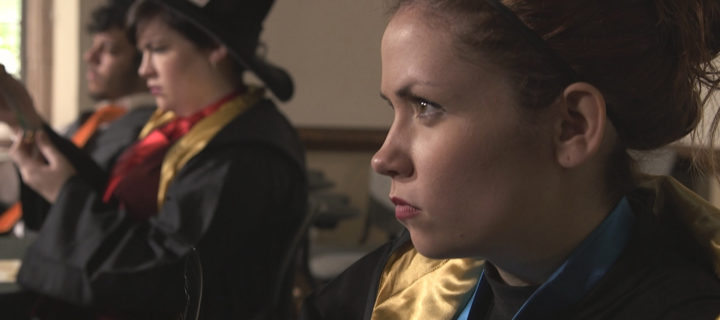Creating Play in the Magical Classroom is a multi-part guide to playing a teacher at the College of Wizardry and New World Magischola larps. While it was written specifically with these events in mind, it can be applied to many other larps and settings.
The texts in this series are written collectively by (in alphabetical order) Maury Brown, Stefan Deutsch, Johanna Koljonen, Eevi Korhonen, Ben Morrow, Juhana Pettersson, Maria Pettersson, Mike Pohjola, Staffan Rosenberg and Jaakko Stenros. The series is edited by Johanna Koljonen.
Part 1 – Part 2 – Part 3 – Part 4 – Part 5 – Part 6 – Part 7
Part VI: Reasons for Your Professor Character Not to Get Personally Involved in Students’ Life-shattering Personal and/or Occult Drama, and How to Play Them
Most of the larp (but especially the last six hours of the game, when every remaining plot-line is culminating at the same time) will be great for students riding their respective plot trains, and an incoherent mess for anyone with some overview of the situation. (That’s people like you, because students will run up to you continuously to report what’s happening).
Towards the very end of the game, it therefore makes good sense for at least a few of the most powerful teacher characters to accidentally incapacitate themselves with port wine or potions to conveniently miss most of the plotting and battles – of course rewarding themselves with some other kind of awesome play, like sitting around a fireplace talking about other memorably failed proms, or making their own incoherent expedition in the wrong direction, or choosing to help the students with the most inconsequential problems, or drafting very long documents for some purportedly urgent purpose, or having an earnestly moving heart-to-heart with an unhappy student, or dancing “old people” dances on the dance floor.
A Good General Strategy All Through the Game Is to Be Exceedingly Optimistic and Trusting of Student’s Abilities
Downplay the severity of any situation and tell them that you trust them to sort it out themselves. If they are alone in the problem, ask them to go to a more senior or specialised student or get a bunch of their friends and get them to help (“you’re all smart students, of course you can do a simple banishment ritual”). If you must be co-opted into a plot, you can say this is a wonderful learning opportunity for students, so they should do most of the work and you are there just as backup in case things go bad.
You Can Ask Students with Similar Problems (or Situations That Appear to Have Narrative Similarities) to Collaborate on Solutions
If you have a student in your class with a special skill you can try attaching them to some other students’ plots (this is especially great if it’s a student who has performed poorly in the actual subject of your class: if you can identify a positive quality anyway and send them on an adventure they’ll love you for it).
Your Character Might Also Not Care about Students or Their Troubles That Much
If you have created a comically grumpy or snobbily cold-hearted character, they might simply not care if a student has gotten themselves into trouble they cannot get out of (“it’s probably their own fault”). Or they might be secretly or even openly glad that students might get injured or die (it’s weeding out the weak and the stupid or you’re just happy there will be less students for you to worry about). You might also think students are lying and telling tall tales (but this might cause them to try to prove it to you and you get sucked in).
If Your Character Has Been a Teacher for a Long Time, There Is Very Little in the Way of Student Generated Drama They Have Not Seen Before
You can play on generational differences, in an infuriating manner if possible. “When I was your age, all seniors actually had to banish a Yeti as part of their final exams – we don’t do it these days, because students just don’t have that kind of mettle”… or “this reminds me of that unfortunate business with the Harpies in ‘86…of course very few of them made it out, so I think we can all agree that the philosopher’s stone is NOT going to be the answer to your question!”
Also, You Can Always Remind the Students That There Is One Force Greater than Magic: Bureaucracy
You would love to help defend the school but there are overdue performance evaluations that need to filled right now — or there will be no school to defend come morning. Alternatively, you can start by reflecting on how to go about saving the school through the proper channels. “First of all you need to put in a request to stay mobile during curfew. Then we need to check that the janitors are informed that watering the lawn should be cancelled, if there is a pack of werewolves on the lawn. Indeed, why don’t I do that.”
This work is distributed under a CC BY-NC-ND 4.0 license. That means you are allowed to use elements of this text beyond the extent of referring and linking to it as long as you credit the original authors and source. It’s not allowed to use parts of this work for commercial purposes, if you are unsure if this applies to your project, please contact us.
This is not intended as a cut and paste smorgasbord but rather a complete text. Please reference it, but avoid using parts out of context. It’s better to just link the articles where it’s appropriate for use.






